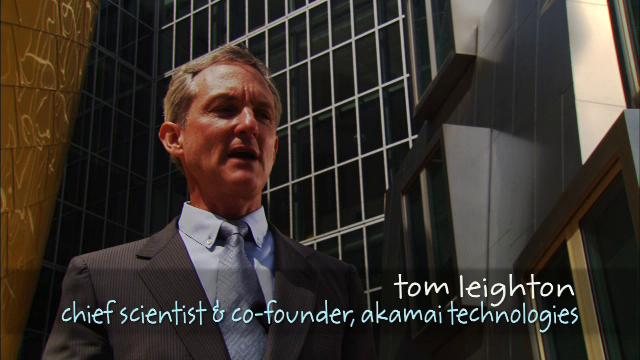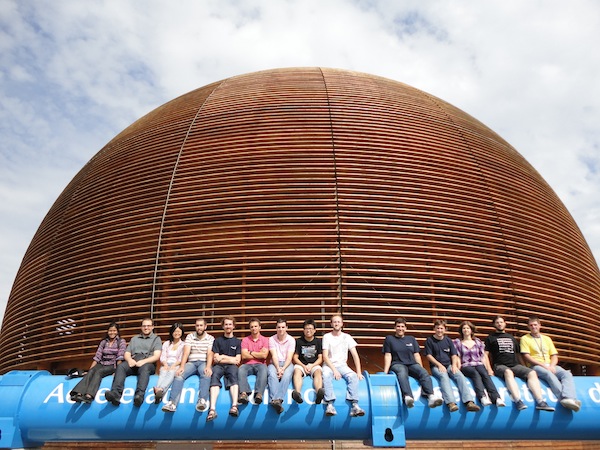Tom Leighton is a very special person. He’s a Professor of Applied Mathematics at MIT as well as the founder of Akamai, a company that revolutionized multimedia content delivery in the late 90s and helped create the unified video-voice-image internet experience that we today enjoy.
The Boolean satisfiability problem (affectionately known as SAT) is one of the most difficult problems in the field of Boolean Algebra (a subarea of algebra that forms the logical basis of Computer Science).

Tom Leighton
At most universities the SAT problem is taught at the final year of the Computer Science curriculum, as an advanced topic. So, imagine my surprise when, during my recent visit to Boston, Massachusetts, I was told that Tom Leighton teaches it to MIT freshmen and sophomores.
Still, what I found even more interesting was the fact that the notes that he distributes to his students mention his affiliation with both MIT and Akamai. In other words, his students, while studying one of the hardest topics of their curriculum, proudly learn that their Professor was the co-founder of Akamai.
Regarding the practice of teaching such advanced topics to first year students, I’ll only comment that it’s strongly correlated to MIT’s ranking as the premier university for Computer Science and Engineering. That said, many European universities also include hardcore mathematics in their curricula (it’s Dijkstra’s continent after all) ― and I strongly believe that such a solid theoretical background is necessary in the current super-competitive global landscape. After all, economies develop not by merely fulfilling market needs but especially by inventing wholly new technologies and markets.
It’s the second point, however, the one about proudly (and casually) presenting both your academic and market affiliations to your students, that that I’d like to focus on in this article. I believe it’s something which illustrates the changes that Europe’s higher education must undertake in order to boost entrepreneurship and job creation.
Our problem is that we have an extremely low level of entrepreneurial activity tied to the academic and research ecosystems, something that results in the following two consequences:
― A “start-up migration wave”, where most of the high-potential start-ups in the EU move to the US,
― A lack of quality jobs that could have been created but haven’t, resulting not only in revenue loss for EU countries but also in brain-drain.
This disconnect between the academic/research world and the industry is not because of a lack of trying. In fact, linking those two has been a top priority for the EU Commission a long time now, and tens of billions of euros have been spend in RTD support programs. Unfortunately the results have been anything but satisfactory.
In my experience, that’s because the European academic and research community simply does not appreciate entrepreneurship, and, pending a paradigm shift, no amount of funding and “commercialisation plans” can change that.
If Tom Leighton had been a Professor in Barcelona, Munich, Lisbon, Toulouse, Athens or Milano, it is very likely that many of his students, as well as many of his fellow professors, would not appreciate his double affiliation, as Professor of the University and co-founder of Akamai.
A philosophy of not “mixing academic work with for profit activities” (stemming from a mix of 20th century’s leftist mistrust for “the market” and 19th century’s notion of “pure” academic research) has been the greatest barrier in transforming European universities to knowledge hubs powering sustainably growing entrepreneurial ecosystems.
Now, in the fifth year of recession for Europe, and with general unemployment in the South higher than 25% (and youth unemployment reaching 50%), it’s finally time to do something about this, instead of idly watching wave after wave of well educated young Europeans failing to find a quality job.

CERN, proof that we’ve got what it takes academicallyWhen Donald Rumsfeld talked about “Old Europe” almost a decade ago, it was one of the very few cases where I had agreed with the guy. Europe is indeed old; it behaves like an old person, it’s slow moving and it is ultra-conservative. Unless we push for some radical changes pronto, Europe can only hope to a slow march to irrelevance, at least in economic terms.
With the global economy becoming increasingly knowledge based, we have to adapt to the new reality and turn our universities into knowledge hubs supplying creativity and innovation into our stale industrial and IT landscape. We can even use our financial conservatism to our advantage, by focusing on financial sustainability as the key horizontal differentiator between entrepreneurial efforts developed in Europe versus the rest of the world.
A lot of analysts have suggest a number of necessary measures for promoting high growth and innovative entrepreneurship in Europe: increasing seed/risk financing, improving bankruptcy legislation, adding entrepreneurship courses at all of the educational levels and realising the single European businesses market.
They are right in their recommendations; but they put the cart before the horse. Such measures are doomed to fail unless they are accompanied by a major cultural and political shift, one that sees students and professors in Barcelona, Munich, Lisbon, Toulouse, Athens or Milano considering the market as a natural outlet for their work and proudly mixing academic and market endeavours.
If we manage to reach that point, where more European students dream of being entrepreneurs instead of playing it safe with an academic, public service or corporate career, a hugely important step towards the future of the European Union will have been made.
We have the human and financial capital, as well as the infrastructure and scale to become a global leader in growth and innovative entrepreneurship. All the pieces of the puzzle are in front of us ― we just need to put them in order.
In a very few words, it is time for us to put market development above academic purity and risk and innovation above security. Following that, we’ll see a number of Akamai-level companies emerging around Europe, and their founders teaching and inspiring the next generation of entrepreneurs. Like Tom Leighton does at the MIT.
ABOUT THE AUTHOR
Dimitris Tsingos is the founder of StartTech Ventures, a start-up incubator in Athens, Greece. A serial tech entrepreneur and pioneer in seed financing, he currently serves as the President of YES (the European Confederation of Young Entrepreneurs).
Dimitris is also the founder of the Hellenic Start-up Association and a board member at the European Business Angel Network. In 2012 he was nominated as one of the Top 40 European leaders under the age of forty.
Dimitris recently completed the IVLP / ANB13 program organised by the U.S. Department of State and the Entrepreneurs Organisation.
